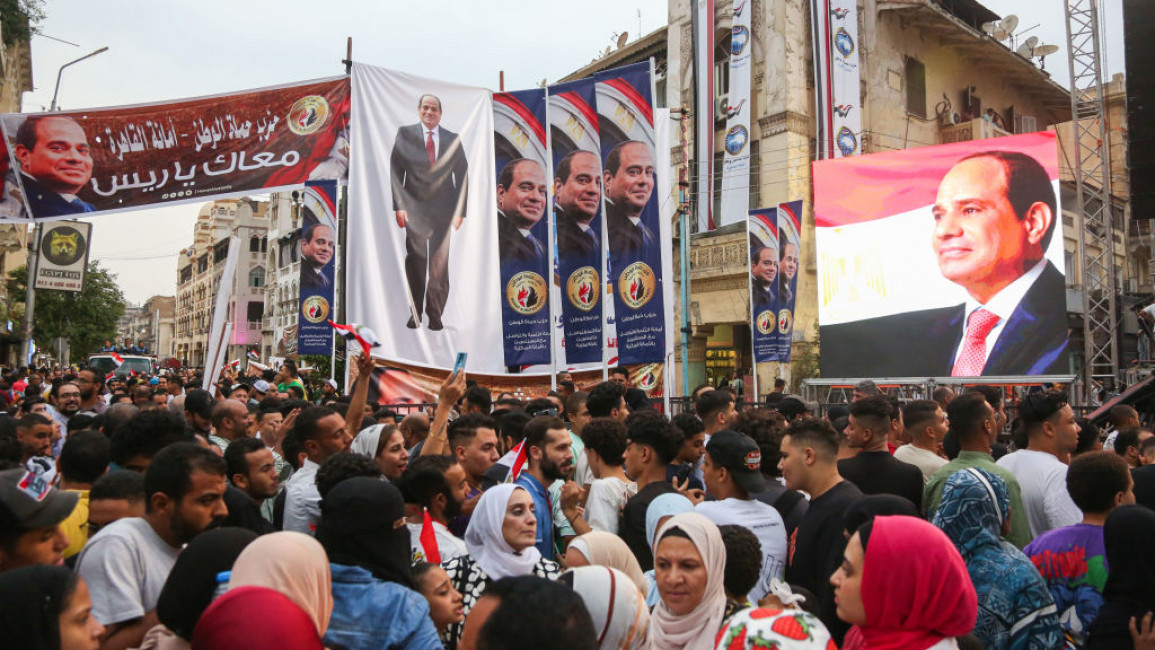
What can we expect from Egypt's presidential elections?

Egypt will hold its 2023 presidential elections over a three-day period starting on 10 December.
Incumbent leader Abdel Fattah el-Sisi is expected to score a defiant landslide victory, but with fighting in Gaza next door and an ongoing economic crisis, it’s a challenging time for Egypt, and the election could set the tone for the next few years of national politics.
A unanimous vote for Sisi will cement his authority and, under the rules of Egypt’s current constitution, allow him a further six years in power, extending his tenure to 16 years.
"The most important thing about this election is the post-election period, where Sisi must manage the economic crisis and at the same time, impede any collateral impact of the Gaza war"
As the election itself is expected to pass without any surprise results, political analysts told The New Arab that post-election events are of much greater importance. 2024 is expected to be a crunch year for Egypt financially. It must repay a record $29 billion of outstanding debt maturities and inflation hovers around 30% with no immediate signs of declining, affecting millions of households.
“The most important thing about this election is the post-election period, where Sisi must manage the economic crisis and at the same time, impede any collateral impact of the Gaza war,” Giuseppe Dentice, head of MENA desk at the Centre for International Studies, told The New Arab.
Despite what is at stake, Egyptians are not expected to head to the polls en masse due to widespread voter apathy and Sisi’s almost guaranteed victory.
“I expect that the voter turnout in the upcoming presidential elections will keep being low and not exceed 50% of the total of those who have the right to vote. This means that the pattern of ignoring or abstaining [in the] vote will continue to be the majority again,” Sherif Mohayeldeen, an Egyptian political researcher and analyst, told The New Arab.
“It is the third presidential election in which Sisi is running, and the issue of his de facto victory is widely recognised, not to mention that the nomination process has ended in the approval of a limited number and less known candidates.”
|
|
Who are the opposition candidates?
Across Egypt, election posters supporting president Sisi line highways, tower over cities on giant billboards, and dominate public buildings. The absence of posters promoting opposition candidates is stark.
Three opposition candidates have progressed to the final round of the vote and they include Farid Zahran of the Egyptian Social Democratic Party, Abdel-Sanad Yamama of the New Wafd Party and Hazem Omar of the Republican People's Party. All candidates are little known and are expected to win a small percentage of the vote.
Due to Sisi’s dominance in the political sphere since he came to power in a 2013 military coup, there is no viable political opposition to his regime and no appetite among Egyptian voters to oppose him.
“The three candidates are weak and not so important in relation to the election, because we already know the results are clear,” Dentice said. “The only meaningful candidate is President Sisi, who we can expect to win the election with a large consensus.”
"2024 is expected to be a crunch year for Egypt financially. It must repay a record $29 billion of outstanding debt maturities and inflation hovers around 30%"
What is the expected turnout?
Ever since the vote following the 2011 revolution, interest in voting has fallen away, Mohayeldeen explains.
“The pattern of withdrawal from casting votes is one of the distinctive features of elections and referendums in Egypt in general, with the exception of some elections that followed the January 2011 revolution, as Egypt witnessed the highest rates of participation in its modern history,” Mohayeldeen told TNA.
“The 2011/2012 House of Representatives elections emerged in first place with a participation rate exceeding 60%, while the re-elections in the 2012 presidential elections competed second with a participation rate of 51.85%. All elections that took place after June 2013 had participation rates lower than these numbers.”
In the latest election in 2018, Sisi won 97% of the vote and around 41% of Egyptians participated in the vote, according to Egypt’s National Election Authority.
Preoccupation with the Gaza war across Egypt is also expected to further weaken interest in the elections as Egyptians turn their focus to supporting the Palestinian cause on social media and boycotting American brands.
What happens after the election?
There is widespread speculation that Egypt’s Central Bank will pull the trigger on a long-awaited currency devaluation in the weeks following the election. After Sisi secures a strong majority, he will likely implement a series of reforms addressing the economic situation, Dentice told TNA.
“Pressure from the IMF and other international partners is very strong. In this sense, it’s very important that President Sisi secures a large majority to implement reform policies, particularly economic policies,” Dentice said.
President Sisi is expected to meet with IMF director Kristalina Georgieva on the sidelines of COP28 in Abu Dhabi later this week. The IMF has repeatedly delayed disbursements of Egypt’s $3 billion program due to the delayed transition to a floating exchange rate.
|
|
Following the outbreak of fighting in Gaza, the IMF has hinted it will step up its support for affected nations in the region and there have been talks of increasing Egypt’s $3 billion program to $5 billion, which will help alleviate Egypt’s towering debt repayment program for 2024.
“The IMF has changed its narrative about the economic policies of Egypt and at the same time, it has created a new availability in terms of funding and compromise,” Dentice said.
Yet despite the signs of optimism, Egypt still needs to fully float its currency to unlock funding. On the official exchange rate, the EGP trades at 30.91 on the dollar. Yet a dollar attracts around EGP 45 on the black market, which some regard as a more accurate valuation of the EGP.
A devaluation will be unpopular among Egyptians, who have suffered the effects of the economic crisis since mid-2022 and in the past 18 months have already seen the EGP lose half of its value against the dollar. In the short term, the devaluation will cause a spike in inflation, causing more pain for households struggling to afford essentials.
Before the start of the economic crisis, around 30% of the population was living below the poverty line, and an additional 30% were considered vulnerable to poverty, according to the World Bank. Rising inflation has made that even more likely.
Yet there is little affected Egyptians can do to change either the results of the elections or their economic future.
“Whatever the percentage of victory, even if it reaches 100%, it is a formality to give legitimacy to a reality that is known to many,” Mohayeldeen said.
Lara Gibson is a Cairo-based journalist closely following Egypt's economic and political developments.
Follow her on Twitter: @lar_gibson




